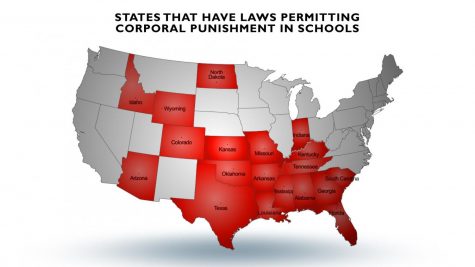Corporal Punishment: Is it ok in school?
March 15, 2018
When it comes to disciplining students in today’s schools, the conversation becomes whether or not it is ok to use physical force. Teachers and administrators are allowed to use restraint when it comes to students causing a disturbance, but as far as physical force, there are no circumstances and to no amount that corporal punishment should be allowed.
In the case of Ingraham v Wright, in 1977, the Supreme Court ruled that the Eighth Amendment does not prevent corporal punishment in public schools. Although, corporal punishment was abandoned as a means of punishing criminals, it was ruled teachers could legally impose reasonable, non-excessive force on their students. However, corporal punishment in school is noncontroversial. According to a study by mic.com, 80 percent of parents and 72 percent of Americans believe that it should not be permitted. Clearly the vast majority of people are opposed to this kind of punishment, for they don’t see it as right to have someone other than parents or guardians physically punish their children.
Not only is the general idea of corporal punishment unpopular, but if you look at who is getting punished, there seem to be targets. Students with disabilities are spanked at a disproportionately high level, despite research suggesting that those with mental handicaps are least capable of understanding why they are being punished. The Department of Public Instruction conducted a national survey and found that while Native American students constituted only 2 percent of students, they received 35 percent of the state’s corporal punishment. Across all races, about 80 percent of those punished are boys.
Although corporal punishment is so unpopular, in the eyes of the law, it is legal in schools. The Supreme Court ruled that the Eighth Amendment does not apply to this situation because students attended an open institution subject to more public scrutiny.
But, when the American Psychological Association, the National Education Association, the American Civil Liberties Union, Human Rights Watch, and the UN Committee on the Rights of the Child are opposed to corporal punishment because it either doesn’t actually work or it is just wrong, maybe we should take a second look at these 1977 rulings.




